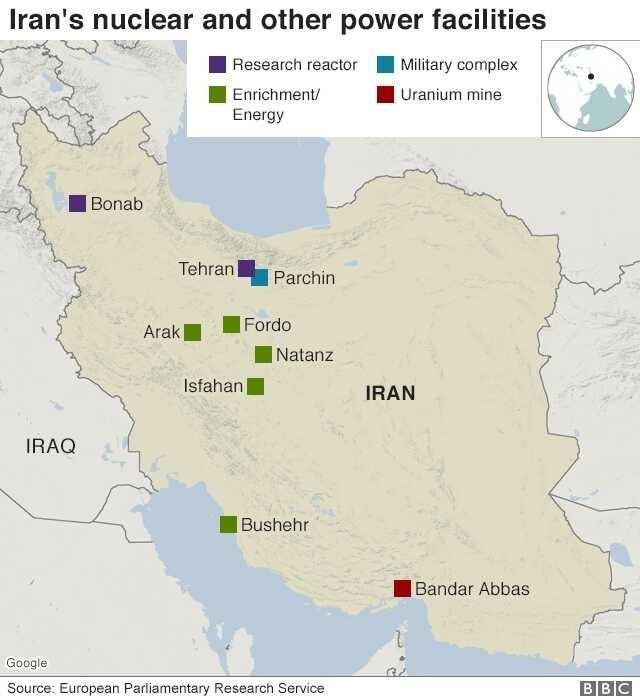
Israeli Prime Minister Benjamin Netanyahu has revealed what he says are "secret nuclear files" proving Iran covertly pursued nuclear weapons.
He said thousands of pages of material obtained by Israel showed Iran had deceived the world by denying it had ever sought nuclear weapons.
Iran agreed in 2015 to curb its nuclear energy programme in return for the lifting of sanctions.
It maintained that it had only been pursuing nuclear energy.
Tweeting earlier, Iranian Foreign Minister Javad Zarif appeared to accuse Mr Netanyahu of "fooling people".
US President Donald Trump has long threatened to scrap the deal, which was reached under his predecessor, Barack Obama.
European powers have said they are committed to upholding the accord.
Could the nuclear deal collapse?
Why the bomb is back
What 'proof' did Netanyahu produce?
Speaking in English from Israel's defence ministry in Tel Aviv, Mr Netanyahu showed off what he said were "exact copies" of documents obtained by Israeli intelligence from a secret storage facility in Tehran.
There were, he said, 55,000 pages of evidence and a further 55,000 files on 183 CDs relating to a nuclear weapons programme called "Project Amad".
BBC map
Project Amad, he said, had had the explicit goal of producing five warheads, each with the yield of 10 kilotonnes of TNT.
Delivering a PowerPoint presentation, he said the dossiers showed Iran had pursued the key elements of a nuclear weapons programme, such as designing nuclear weapons and preparing for nuclear tests.
Iran, he said, had considered five different sites for conducting nuclear weapons tests.
"Here's what the files included: incriminating documents, incriminating charts, incriminating presentations, incriminating blueprints, incriminating photos, incriminating videos and more," he said.
"These files conclusively prove that Iran was brazenly lying when it said it never had a nuclear weapons programme," he added.
The files had been shared with the US, Mr Netanyahu said, and would be submitted to the International Atomic Energy Agency (IAEA).
A 2007 US National Intelligence Estimate assessed "with high confidence" that Iran did have a nuclear weapons programme up until 2003 but Iran had stopped it after its discovery.
On Monday, the Israeli prime minister argued the alleged files proved Iran had been "secretly storing Project Amad material to use at a time of its choice to develop nuclear weapons".
How was the 2015 deal meant to work?
The agreement signed between Iran and six world powers lifted crippling economic sanctions in return for curbs on Tehran's nuclear programme.
There had been fears that Iran would use the programme to create a nuclear weapon.
Under the deal, officially known as the Joint Comprehensive Plan of Action (JCPOA), Iran is committed to slashing the number of its centrifuges, which are machines used to enrich uranium.
It is also meant to cut its stockpile of enriched uranium drastically and not enrich remaining uranium to the level needed to produce nuclear weapons.
The number of centrifuges installed at Iran's Natanz and Fordo sites was cut drastically soon after the deal while tonnes of low-enriched uranium were shipped to Russia.
Furthermore, monitors from the IAEA have been able to carry out snap inspections at Iranian nuclear sites.
Iran nuclear deal: Key details
How dangerous is the enmity between Israel and Iran?
Tension between the long-standing enemies has grown steadily since Iran built up its military presence in Syria, Israel's north-eastern neighbour.
Iran has also been accused of supplying weaponry to Lebanese Shia Muslim militant group Hezbollah, an enemy of Israel, and also smuggling arms to Palestinian militants.
Mr Netanyahu has long vowed to stop Iran from strengthening its military presence in Syria.
On Sunday night, a wave of unclaimed air strikes on targets in Syria reportedly killed a number of Iranians.
Sites allegedly linked to a covert Syrian chemical weapons programme were bombed by Western nations earlier this month.
Israel has also carried out, or is believed to have carried out, dozens of air strikes on facilities in Syria used by Iranian forces.
collected from
http://www.bbc.com/news/world-middle-east-43952196
Hi! I am a robot. I just upvoted you! I found similar content that readers might be interested in:
http://www.bbc.co.uk/news/world-middle-east-43952196